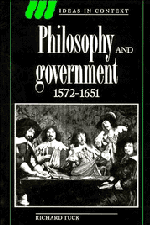6 - The English Revolution
Published online by Cambridge University Press: 05 July 2011
Summary
INTRODUCTION
The intellectual innovations represented by Grotius' work on history and political theory were eagerly picked up by a wider European public, hungry for just the modern extension of humanist ideas which he seemed to provide. His works were studied closely in France, particularly in the circle round Marin Mersenne to which Hobbes belonged, and I shall give some account of this in Chapter 7. But it was perhaps England which was the main breeding-ground for Grotian and post-Grotian ideas. English society by the early seventeenth century had come to resemble the Dutch society in which Grotius had operated: there, too, a variety of Protestantism uneasily co-existed, though with an established Church whose doctrine was not straightforwardly Calvinist, and there, too, we see clearly the beginnings of a kind of mercantile imperialism (though not yet on anything like the Dutch scale). Two groups of Church men claimed rights over the lay population: one was the hierarchy of the Anglican Church, with an apparatus of Church courts and legal privileges which actually gave them more extensive legal powers than the Dutch Calvinists enjoyed, while the other consisted of those ministers who wanted to convert Anglicanism into a presbyterian form of Church government, and who appealed to Scotland and the post-1619 United Provinces as their models. Both groups were antagonistic to one another, and either one at different times could appear the greater threat to the interests of the lay population.
- Type
- Chapter
- Information
- Philosophy and Government 1572–1651 , pp. 202 - 278Publisher: Cambridge University PressPrint publication year: 1993
- 1
- Cited by

